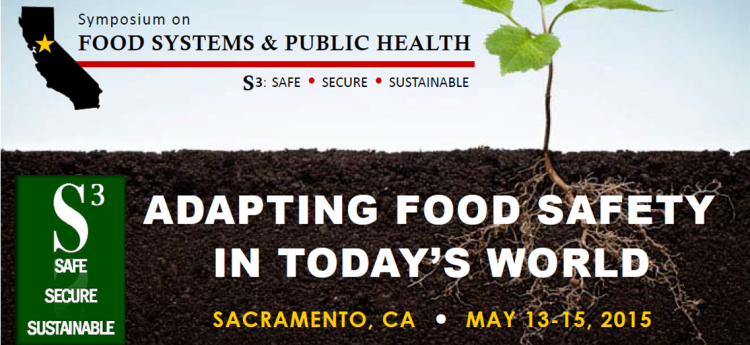
 by Leanna Sweha
by Leanna Sweha
Sacramento Food Literacy Center founder Amber Stott and Concord culinary teacher Cindy Gershen spoke earlier this month at the Symposium on Food Systems and Public Health. Each discussed how their school-based programs have the capacity to improve not only the diets of children but also their overall future.
Stott, who grew up in a family that raised and cooked its own fruits and vegetables, was motivated to act when she realized how few of her peers knew how to cook. “There are now two generations of Americans with poor cooking skills,“ she said.
In 2011, Stott founded the Sacramento Food Literacy Center, which provides an after-school cooking and nutrition program called “Your Sandwich Can Save the World!” to low income elementary students.
The center’s mission is to “inspire kids to eat their fruits and vegetables” and to create life-long healthy habits. “‘The younger you reach children, the more likely they will develop a taste for healthy foods,” Stott said.
The center has a small staff and also trains community members who volunteer to teach the curriculum. Stott noted that the center has compiled three years of assessment data showing the positive impact of its program, which has reached thousands of students.
In 2013, Stott was named “Food Revolution Hero” by the Jamie Oliver Food Foundation and also received a “40 under 40 Award” from the Sacramento Business Journal.
Gershen is a chef, restaurant owner, and culinary arts instructor at Mt. Diablo High School in Concord. She is perhaps best known as a contributor of low-sugar recipes to the New York Times bestseller The Fat Chance Cookbook.
Gershen helped develop an innovative education program in partnership with the Mt. Diablo School District Food Service Department and the Walnut Creek Wellness Challenge, a non-profit she founded.
Gershen approached the school district with the goal of bringing home economics – specifically cooking – back into the curriculum. In the 2011 pilot, students served lunches to their teachers which they prepared using produce from the school garden.
Gershen next worked with environmental science teacher Patrick Oliver to incorporate STEM standards into the class, which is now called “Integrative nutrition and business” and is as part of the “Hospitality and Tourism Academy” career technical program.
Students learn food science, culinary and business skills. Through the program, many students have found food service jobs both before and after graduation.
Gershen recently escorted some of her students to Washington, D.C. to lobby the USDA for similar career technical programs across the country in which students would help run school cafeterias.
The symposium was held in Sacramento by the California Conference of Directors of Environmental Health. John Rogers of the Sacramento County Environmental Management Department, and symposium chair, explained why food systems was a topic. Counties now enforce regulations dealing with chronic disease, such as menu labeling and trans-fat rules. “We began to add these types of sessions, because we realized we needed to educate our inspectors about the causes of chronic public health problems,” Rogers said.
Leanna M Sweha, JD, has been a resident of Davis for 20 years. As a young molecular biologist in a USDA lab working to engineer Roundup-resistant corn, she grew interested in sustainable agriculture. Fascinated with the legal and policy issues of agricultural genetics, she became an attorney specializing in agricultural and natural resources law. She has worked for the California Resources Agency and the UC Davis Office of Research.

“There are now two generations of Americans with poor cooking skills,“
“‘The younger you reach children, the more likely they will develop a taste for healthy foods,”
I see the effects of the generational combination of poor cooking skills and familial unhealthy eating practices in my clinic every day. I thank everyone involved in this educational effort and Leanna for continuing to provide us with information on the ongoing efforts.